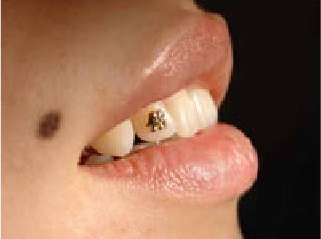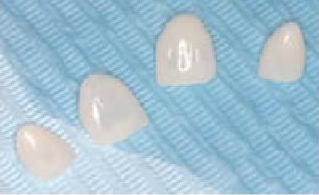Advices
Symptoms:
A sudden sharp pain after contact with cold or hot foods which then subsides spontaneously.
A probable reason:
If the pain does subside spontaneously and does not last long, it might not be a serious problem. Sensitivity may be caused by some damage of the tooth filling or, as it frequently happens, by exposure of a small part of the tooth root.
Advice:
Try brushing your teeth with a toothpaste for sensitive teeth (eg. Sensodyne). Use a specially designed soft-bristled toothbrush. If the symptoms do not pass after a few weeks, consult your dentist.
Symptoms:
After dental treatment, the tooth is aching and reacting to cold and hot foods and drinks
A probable reason:
Some types of dental treatment may cause pulp (nerve tissue) inflammation. It is usually a temnorarv and revertible reaction.
Advice:
Wait 4-6 weeks. In most cases the sensitivity after dental treatment eases off spontaneously. However, if the pain aggravates or starts to appear without any thermal stimulus (eg. cold or hot food and drinks) one should seek medical advice. The need for performing a root canal therapy might be expected.
Symptoms:
Sharp pain while chewing
A probable reason:
There are a number of possible reasons for such reactions:
- a large cavity
- a loss of the filling
- tooth cracking
The damage apparently has reached the pulp (inner nerve tissue of a tooth
Advice:
It is necessary to consult your dentist. If the pulp has been damaged, a root canal therapy has to be performed. The tooth can be restored with a prosthetic crown.
Symptoms:
Persistent pain in your tooth after eating or drinking cold or hot things.
A probable reason:
Perhaps, the cavity caused an infection which has led to the pulp damage. The pulp might have been also damaged during non-invasive dental treatment.
Advice:
Contact your dentist. A root canal therapy may save your tooth.
Symptoms:
Constant and acute pain in your tooth, discomfort and swelling of the gum, sharp toothache while chewing and touching.
A probable reason:
The infection has spread from the root canal to the bone surrounding your tooth.
Advice:
You should contact your dentist immediately. Several staged endodontic treatment needs to be carried out. Antibiotic treatment is necessary. In extremely serious cases a tooth extraction may be unavoidable. Before seeking medical advice, take painkillers.
Symptoms:
A dull pain and a pressure sensation in the upper teeth area. Additionally, you may be running a fever.
A probable reason:
Perhaps, the reason is inflammation of the maxillary sinus. If there are no signs of fever, the symptoms may also imply bruxism (pathological teeth clenching and grinding)
Advice:
Consult your dentist. Antibiotic therapy and ENT specialist appointment may be necessary.
Symptoms:
A chronic, dull or recurrent pain in your head, neck or ear.
A probable reason:
Sometimes the infected pulp may be the source of pain in a temple, ear or neck. However, other health conditions should be also taken into consideration.
Advice:
The dental examination will help to establish if your condition is connected with any teeth problems. appointment with other specialist may be required.









